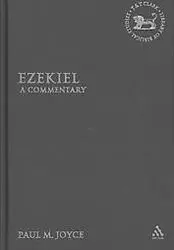

Ezekiel: A Commentary
Pages
307 pages
Publisher
T&T Clark
Published
3/1/2008
ISBN-13
9780567026859
Reviews
Summarizes scholarly
positions very effectively.
Paul Joyce, one of the leading experts on the book of Ezekiel, provides a wealth of balanced information reflecting current trends in the study of Ezekiel in this survey of the whole book of Ezekiel. This book brings together the fruit of Joyce’s extensive research in a comprehensive and accessible way. It demonstrates his uniformly keen balance of both the historical-critical and thematic issues related to the book. This monograph is, in fact, a commentary, but one that does not fully follow the commentary form. Instead, it has an extensive introduction and massive bibliography, like those found in commentary series such as Hermeneia, while the commentary proper is more abbreviated, similar to The New Jerome Biblical Commentary. The result is a bit disconcerting. On the one hand, it focuses on the issues with which most readers are concerned. On the other hand, it sometimes leaves the scholar wanting to know more about the arguments that support Joyce’s conclusions. The book’s introduction, which covers the book’s provenance, its relationship to earlier traditions, its major themes, text-critical issues, and the book’s influence on later Jewish and Christian traditions, could be assigned at the graduate level to introduce students to the status quaestionis of Ezekiel’s research. This section of the book presents a well-balanced survey of diverse approaches to these various issues in a rhetorical style that is immensely readable. The forty-one-page bibliography gives an ample starting point for students looking to conduct further research on the book. Throughout the book Joyce’s strength is his treatment of thematic issues, in part because he genuinely appreciates the theology of Ezekiel.
[Full Review]
Paul Joyce’s leadership in the study of the book of Ezekiel is already well established by his many articles and papers concerning this book and particularly by his seminal monograph, Divine Initiative and Human Response in Ezekiel (JSOTSup 51; Sheffield: JSOT Press, 1989). It is a joy, then, to find him here presenting his vision of the entire book. Although called A Commentary, this book is in many ways more accurately described as a series of exegetical essays. As Joyce states in the preface, “There is no intention in this volume to address every critical issue.… My purpose is to make a distinctive contribution to the interpretation and understanding of the book of Ezekiel, particularly in terms of its theology, grounded in both historical research and literary sensitivity” (vii). Correspondingly, fine points of text criticism, translation, and composition are not rehashed here. Instead, after an extended (sixty-page) introduction, Joyce proceeds through Ezekiel chapter by chapter, touching on select verses that raise controversial questions and drawing out distinctive points of theological emphasis. An extensive forty-one-page bibliography and indices to authors and text references enhance the usefulness of this volume. Having laid his cards on the table in the preface, Joyce’s starting point in the introduction is no surprise: he considers the ministry of Ezekiel the prophet-priest in its sixth-century exilic context. This may seem an obvious beginning point; however, recent interpreters have often preferred to ignore, or at least to bracket out, historical issues, reading the book synchronically and regarding Ezekiel as a literary character rather than as a figure of Israel’s history. Joyce rightly recognizes that the literary features of this book cannot be properly understood apart from their historical setting.
[Full Review]

